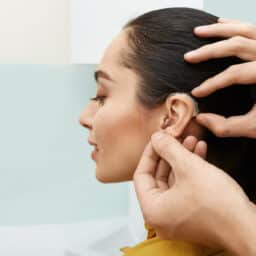It’s no secret that a night at the movies can be pricey. Many people with hearing loss, even those who love the movies, may question whether it’s worth it if they miss some of the action or have difficulty keeping up. Fortunately, in the U.S., most movie theaters are accommodating to people with this condition. We review how to make the most of the movie theater if you have hearing loss below.
Wear Your Hearing Aids

If you have hearing aids already, wear them! This is the best way to ensure you can hear well while out at Terrace Theater enjoying the latest release. If anything, you might find that the audio is too loud. If so, there’s an easy fix: simply turn down the volume on your hearing aids or activate the loud noise suppression feature, if your device has one.
Use Assistive Listening Devices
Assistive listening devices may be used with or without hearing aids, depending on the type. Some common assistive listening devices used by movie theaters include:
- FM systems, which use radio frequencies to transmit amplified sound through a receiver worn in the ear
- Infrared light systems, which transmit sounds to a special receiver that can be adjusted to the desired volume
- Induction loop systems, which send sound signals to the telecoil in your hearing aid or cochlear implant when you select that setting on your device
Ask About Captioning
According to one study, “The most frequently used compensation strategies were changing TV or [hearing aid] volumes and using closed captioning. Only few HA users used audio streaming accessories.” This indicates that many people find captioning preferable to using accessories such as assistive listening devices.
If you share the same feelings, there are typically two captioning options: open captioning and closed captioning.
- Open captioning is when the text appears on the screen for everyone to see. It’s less common than closed captioning, but some theaters offer special open caption viewings.
- Closed captioning is when you use a system where the captions are private. For closed captioning, you must request a special device that displays the captions where you’re seated.
For more information on the benefits of hearing aids or to schedule an appointment, call Charleston ENT & Allergy today.
